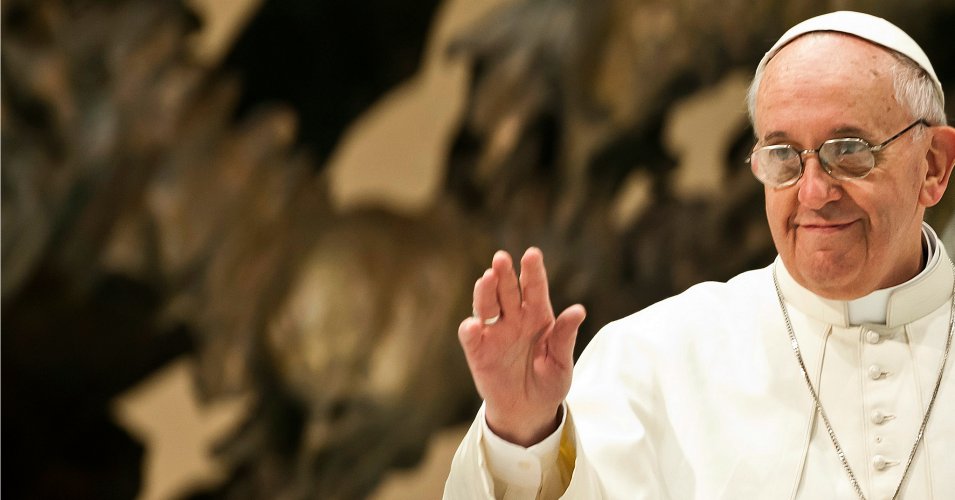When presidential candidate Jeb Bush wanted to criticize Pope Francis for writing an encyclical on climate change, Bush is reported to have said that religion “ought to be about making us better as people and less about things that end up getting into the political realm.” In other words, religion should stay clear of economics and politics, and the Pope is getting too close.
If I may quote one of my children’s favorite exclamations to summarize the Pope’s much more lengthy and eloquent response in the encyclical Laudato Si’: That’s ridiculous!
But the majority of American Christians don’t see it that way. The distinction between religion and politics/economics makes total sense to us. We’ve been schooled to believe the myth that religion has to do with our private, inner lives—our souls—and not the wider world of public matters like politics, economics, and science. The reality of climate change and how to respond belongs, according to this myth, to the latter.
This religious myth is just another form of the heresy of Gnosticism which Christianity has been fighting from its beginning. Gnosticism taught that our souls are connected to God, and the rest of the world can be rejected or enjoyed, whichever you like. None of the rest matters. “Gnosticism,” scholar Harold Bloom has said, “is the American religion proper.”
Which is precisely why many American Christians have such a hard time relating our faith to anything other than our souls. Like race, for instance. Or the environment. Pope Francis is teaching us why we should learn.
The Pope’s argument hinges theologically on the distinction between God and creation.
It feels almost silly to need to be reminded of this: Christians believe in one God who is “Creator of heaven and earth, of all that is, seen and unseen,” as we say in the Creed. “All that is, seen and unseen”—creation, in other words—is oriented toward God as its source and purpose for existence. And “all that is” includes human culture, politics, and economics as well, however disordered. Everything belongs. Getting this distinction straight is critical.
Because, Francis says, we humans have long failed to do just that. We have imagined that we are on the God-side of the distinction. We have allowed our politics and economics to treat the rest of creation as if it were oriented toward us as its source, useful for our purposes alone. And the “our” here are those with wealth and power. The rest have been left out.
We have created what Pope Francis calls a “throwaway culture.” We “use” creation for our purposes. Along the way we have damaged it. And the world’s poor suffer from that damage disproportionately.
The discussion of these things may not belong within the sphere of gnostic American religion, but it does within the sphere of the Christian religion—for everything does. For Christians, there is no realm—politics, culture, economics, science—outside of the scope of God’s creation and free from consideration of how it should be ordered toward God and the common good of all—including the non-human creation.
This is Christianity 101—basic stuff. But the myth of the distinction between the religious sphere and these others is endemic, it seems. Among the other reasons we need this encyclical—and there are many—we need it for the Pope’s eloquent “No!” to this myth. This “No!” is particularly important as we enter a presidential race in which religious people who want to speak about politics will too often be told, from both sides of the political line, to get back where they belong.
I know a pastor talking with a church’s search committee about whether she should become that church’s next pastor. A member of the committee told her, “We don’t want sermons about politics.”
My advice to this pastor: Give the search committee a copy of Pope Francis’s encyclical on climate change, and say, “Read this, then let’s talk.”
Of course, friend, don’t hold your breath waiting to be hired.
The Rev. Dr. L. Roger Owens is associate professor of leadership and ministry at Pittsburgh Theological Seminary and teaches courses in the MDiv, Doctor of Ministry, and Continuing Education programs. Before coming to PTS he served urban and rural churches for eight years in North Carolina as co-pastor with his wife Ginger. He has written multiple books including The Shape of Participation: A Theology of Church Practices which was called “this decades best work in ecclesiology” by The Christian Century.


There are two more aspects of American Gnosticism that bear mentioning. One is a commitment to the inevitability of progress—what sort of progress tends to divide along the sides of the political fence. The second, and related, aspect is the prior political commitments held by left and right that are brought to their view of Christianity. As Christians our politics, like our preaching, begins and ends in the Word—living and written—of God.